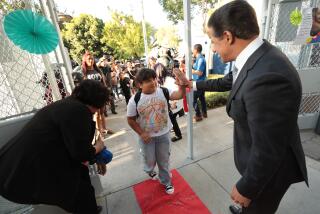Statewide Math Standards
Re “A Teacher’s Adventures in Standardsland,” Commentary, Dec. 3: Praise be to the Jagowocky (Carol Jago). I’ve been behind the looking “class” for 31 years and have seen all the shifts--new math, transformational grammar, the new new math, criterion referenced reading, ad infinitum. And what’s left of all these “reforms”? Only the smile on teachers’ faces when they say, “I told you so.”
Yesterday and today I spent three hours of important instructional time having students staple required cover sheets to their work to be assessed to see if they met a “standard”--time better spent in teaching rather than secretarial chores. Again, the object of “reform” is not to check on a child’s progress, it’s to check up on those sluggard teachers--are they doing their job? “Off with their heads!” And the in-the-trenches teachers weren’t even invited to the standards selecting tea party.
Again, California is engaged in a croquet game, now called standards, and we’re making up the rules as we play. It’s too bad that our children wind up being the croquet balls!
ROBERT W. BRUESCH
Rosemead
* Re “Digging Out of a Math Pit,” editorial, Dec. 3: Whether or not a high school math teacher has a minor in math is not indicative of the quality of education that teacher can provide, as The Times and others suggest. Math is a tool used daily not just by mathematicians but by all manner of scientists and engineers, any of whom should be qualified to teach high school math without a math minor, at least up until calculus.
Some teachers are certainly underqualified and emergency credentials perhaps overused. But arbitrary metrics like percentage of teachers with a math minor are misleading and less important than teaching aptitude and a good curriculum.
ALAN MAZER
Pasadena
* Your editorial got it wrong by half, regarding the State Board of Education’s proposed math standards for schools. While emphasizing important basics and memorization, the board axed development of understanding, application and critical thinking skills students will need to live in the 21st century.
In one stroke, the board discards the last three years’ hard work and reasoned consensus among math professors and teachers, college professors who use math in their teaching (science and business) and public representatives.
Math experts have praised California’s efforts to date to develop world-class standards that are achievable. Education should not develop mere “automaticity” that will lead us to an unquestioning and compliant work force. California needs workers who can use math in sophisticated ways; society’s and business’ challenges demand critical thinking skills. Math understanding, including basic skills, will get us there. The State Board of Education’s deficient proposal won’t.
JAMES M. HIGHSMITH, Chair
Academic Senate, CSU System
Long Beach






